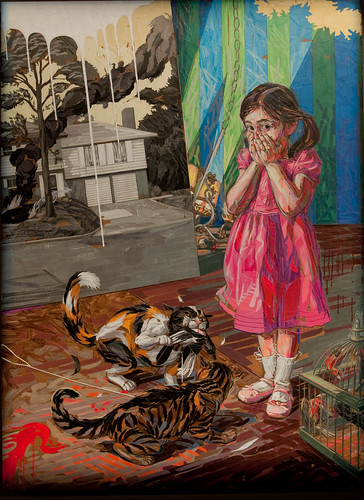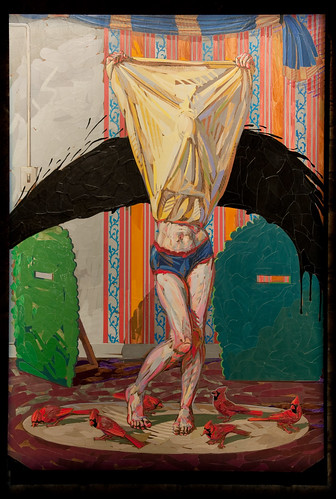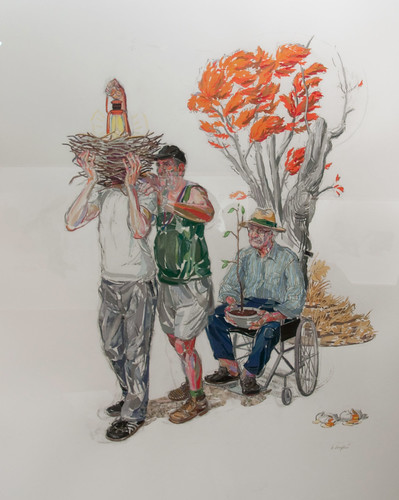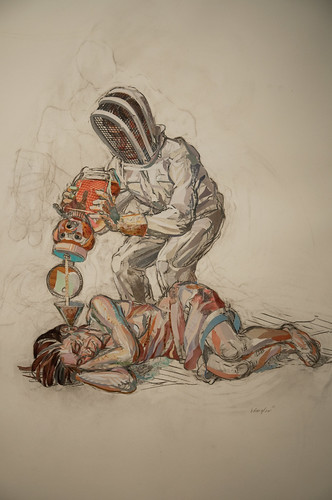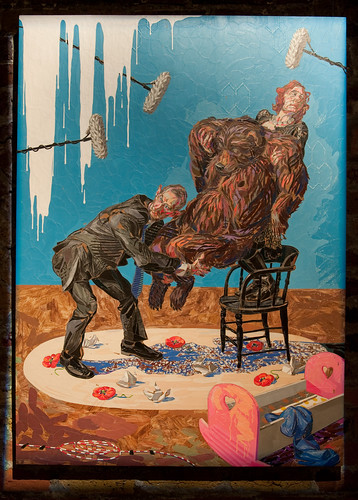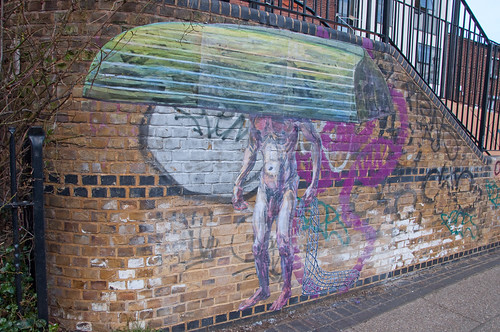Black Rat Projects
Rivington Street,
London
10 Mar – 7 April 2011
photos: NoLionsInEngland
I first came across Brian Adam Douglas’ gallery work in a project room installation at The Leonard Street Gallery in 2007 and was knocked out by it. Poo-Tee-Weet from that show remains one of my favourite pieces art.
Brian Adam Douglas has made many visits to London and under his alter moniker Elbow Toe frequently gets up on the streets with pastel drawings, short poem stanzas but most notably paste- up original art of stunning quality and beauty. I have a fond memory of Elbow Toe several years ago comparing the tension of even wheatpasting in New York to chilled out daytime high street pasting in London.
Brian Adam Douglas’ latest UK show at Black Rat is his first London solo show, having already been exhibited in almost this form up north at Warrington Museum late last year. There are 17 original paintings and 12 preparatory sketches. The originals fall into two distinct formats, those on paper with negative space background and those on wood panels with generally full colour background, the artistic style is virtually identical in both forms.
Previously, Brian Adam Douglas’ distinctive studio work was based upon intricate lino cut images featuring twisted figures with multiple jointed limbs and stylistic references to classical forms of figurative painting . Often the work would be confused with art from Swoon or Denmark’s Armsrock. Now we are more familiar with his “trick” of creating collages of finely cut shreds of coloured paper in such a way that from any distance greater than about 12 inches the result looks like a beautiful traditional brush painting. The device is stunningly executed but no mere gimmick.
(titled “The Family Pet” when shown at the Warrington Museum. Curious)
The title of the show clearly defines the core theme throughout the work (with one exception), something which the artist ambiguously describes on the night as grappling with the issues of trying to become a parent. We can’t be sure whether this alludes to the mechanics of the formative processes or the lifelong struggle of nurturing a baby human from smeared greasy new-born to first wage slip, but the distinction isn’t that significant when it comes to reading each of the paintings, a label that we will stick to for convenience.
My own allergy to negative space is blown away by the works on paper in this show. In most cases the absence of background throws focus on the form and content of the central image, whereas the full colour compositions tend to have as much intrigue, meaning and food for thought as the painting subject itself. Look at the McGee-esque background to PTW from 2007 above.
One of the beauties of the art is that each picture has picks out a doubt, concern or paranoia that every well intentioned parent feels at some point or another but doesn’t articulate anything like as well as Brian Adam Douglas paints it. In “Tradition” below, the point seems to be paradox between the new parent feels himself blindly stumbling into parenthood without a route map blind to the guiding hand of his immediate forbearers.
Assume Crash Position is a gentle humorous allegory on the notion that whilst life starts with parenthood, at the same time there is a part of existence that ends with a crash. Give the man oxygen
With the meaning being a matter of one’s own interpretation what one sees in an image, Sweet Dreams provides a dilemma, is this tender nurturing of a loved one, or an insidious implanting of the seed of an idea into the woman, or even literally the seed? Both messages sit happily alongside each other in my mind and doubtless you can come up with other different interpretations. It’s a beautiful painting whatever it means to you. In Sweet Dreams you can also see the artist’s charcoal construction lines, it’s probably no accident that where these remain a feature of the finished piece they add hints of motion.
Looking at a couple of the full colour collage on birch panel paintings, Bears shows a couple of parents struggling with a beast, an inconvenient clumsy oversize un-cooperative helpless beast, which just about hits the nail on the head. The microphones suggest paranoia, the sense that one is under scrutiny and making ones mistakes in full public gaze. Avoid that by not slapping your kids in the supermarket aisle;-) One thing I found un-necessary in this picture was the spilled paint, it may be another significant detail whose meaning I miss but I’m afraid I just see an art cliché specially beloved by the urban fraternity. Brian gives us another interesting conundrum by pluralising the title.
In a show of constant delights, the stand-out canvas is “The Memory of You is Never Lost On Me”. Measuring an enormous 2.1m by 1.4m. The central character, recently bereaved (I was told) is engaged in a kind of memorabilia purging and we see across the painting the echoes of various key moments in his life. Immediately to his right, a woman I take to be his wife embroiders a beautiful tablecloth on which sit boxes, possibly piles of note and further right again in diminishing scale denoting reducing significance to the narrative, we see a child playing with a piñata, nursery toys and curiously positioned, almost slightly surreal old fashioned toys like the stick and hoop. The beekeeper is a motif which comes up several times in the work, in this case the young lover is becoming married and his new wife enacts a Greek wedding ritual by dipping her hand into a pot of honey symbolising sweetness and fertility. The bees swarm up and through the smoke from the burning of the man’s reconciled memories, where of course they would become drowsy. Would it be too obvious to suppose that it all starts with the birds and the bees?
The picture explores a theme similar to the novel “Any Human Heart” by William Boyd though it was evident this is happy coincidence. The last time I felt a similar desire to just stand and absorb and ponder the many different facets of a painting was in front of Picasso’s Guernica in Madrid.
Visiting American street artists bring to the London urban art honey-pot a rare level of intelligence and intrigue and occasional new world migrant to mention in this context would be Swoon and Judith Supine. Less often mentioned is Brian Adam Douglas, a.k.a Elbow Toe though on the basis of this show that ought to change. Due Date is a truly epic show, one of those rare occasions where engaging with the art at the opening took precedence over the socialising.
Graffoto could and would love to go on and on sharing its thoughts on each and every single painting but that would spoil things, as well as being rather tedious. Instead, check out the full photo set on flickr, let Graffoto know your insights.
Postscript for anyone curious regarding Elbow Toe, Elbow Toe is alive and well and before the show opened placed a new piece of hand coloured art on the streets, or the tow-path to be more accurate. In case anyone should question the taste – these photos were taken before the natural disaster (and Fukushima man-made disaster) in Japan. Very clairvoyant.
There is an ever increasing gap in style between Elbow Toe and Brian Adam Douglas and we hear there are unlikely to be any Elbow Toe prints in future.



